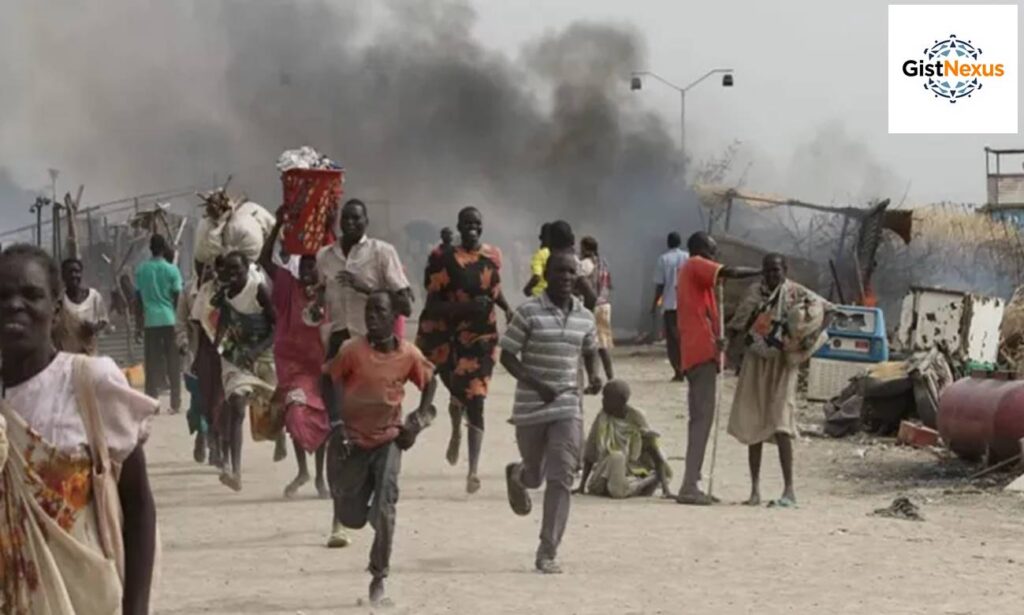March 24, 2025 – Juba, South Sudan.
Germany has closed its embassy in the capital, Juba, in South Sudan temporarily as tensions in the country escalate, raising fears of a fresh civil war. The action, announced on Saturday by the German Foreign Ministry, reflects the deteriorating security situation in the world’s youngest country.

Escalating Fears of Instability
GistNexus has gathered that German Foreign Minister Annalena Baerbock justified the decision on Bluesky social media, saying that South Sudan is “once again on the brink of civil war” following years of precarious peace. The crisis unit of the German Foreign Office deemed it necessary to temporarily shut down the embassy in order to protect personnel.
More Trending News
Namibia’s First Female president, Nandi-Ndaitwah, Takes Office
President Donald Trump has Signed Order Dismantling US Education Department
The instability owes a lot to South Sudan President Salva Kiir’s and Vice President Riek Machar’s political rivalry. Baerbock squarely faulted the two leaders for plunging the nation into further crisis and demanded that they assume responsibility to break the cycle of violence and ratify the peace agreement signed in 2018.
Background of the Conflict
South Sudan has remained under a permanent state of instability since it became independent from Sudan in 2011. Euphoria accompanying its independence eventually turned into political instability, as it precipitated a brutal civil war in 2013 pitting Kiir’s army and Machar’s. The civil war lasted five years and caused over 400,000 casualties, displacing millions of people.
A 2018 peace agreement brought a relative calm that saw the formation of a national unity government in which Machar was reinstated as vice president. There have been ongoing tensions, however, with both men having deep-seated suspicions regarding the other man’s intentions. Kiir views Machar as a threat to his leadership, Machar asserts that Kiir is ruling in an iron-fisted style and forcing political rivals to the periphery.
Renewed Fighting in Upper Nile State
Recent clashes in Upper Nile State have made the return to full-scale war much more of a fear. President Kiir recently dismissed the state governor, further increasing tension between government soldiers and ethnic militias. The clashes have been predominantly between Machar’s ethnic group, the Nuer, and government soldiers. The army accused Machar’s force of perpetuating the violence, but Machar’s supporters claim Kiir was attempting to incapacitate his rivals by removing top political leaders.
More Trending News
Namibia’s First Female president, Nandi-Ndaitwah, Takes Office
President Donald Trump has Signed Order Dismantling US Education Department
The violence is not limited to Upper Nile. Reports suggest that clashes have also broken out along South Sudan’s border with Ethiopia, posing a threat to regional stability. Analysts caution that outside forces, including rival factions from neighboring Sudan, could further complicate the situation if they decide to intervene.
International Mediation Efforts
The escalating instability has caught the attention of the international community. German officials along with those from Canada, the Netherlands, Norway, the United Kingdom, the United States, and the European Union have indicated willingness to mediate between Machar and Kiir in order to prevent further escalation.
The German Foreign Ministry has urged both leaders to uphold their 2018 peace agreement and refrain from stumbling into further action that could leave the nation back in war again. With the history of failed agreements and lingering distrust between the two factions, however, the question remains whether diplomacy will be enough to prevent another full-scale war.
Possible Effects of New War
If South Sudan reverts to civil war, the humanitarian consequences can be devastating. Over four million were displaced from their homes in the previous war and ran for cover to surrounding Uganda, Sudan, and Ethiopia. Again, if fighting should return, it could elevate already chronic humanitarian tragedy further, because serious food crises remain, infrastuctures are fragile, and there remains minimal medical provision in South Sudan.
Moreover, the instability would compromise regional security and trade. Bordering countries, the majority of which are already grappling with domestic conflict and economic woes, might be further taxed in managing refugee flows and border clashes. Conclusion
Temporary recall of Germany’s embassy in Juba is a sharp manifestation of the worsening situation in South Sudan. With threats of another civil war hanging large over the country, the international community is keeping an eye on events. If diplomatic moves will halt further violence or not is anyone’s guess, but one thing is certain: South Sudan stands at the crossroads, and the choices its leadership makes in coming weeks and weeks may determine the fate of the country.
More Trending News
Namibia’s First Female president, Nandi-Ndaitwah, Takes Office
President Donald Trump has Signed Order Dismantling US Education Department

Reported by GistNexus Team and Edited by Mr. Chibueze Onwuka
